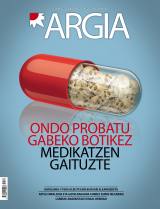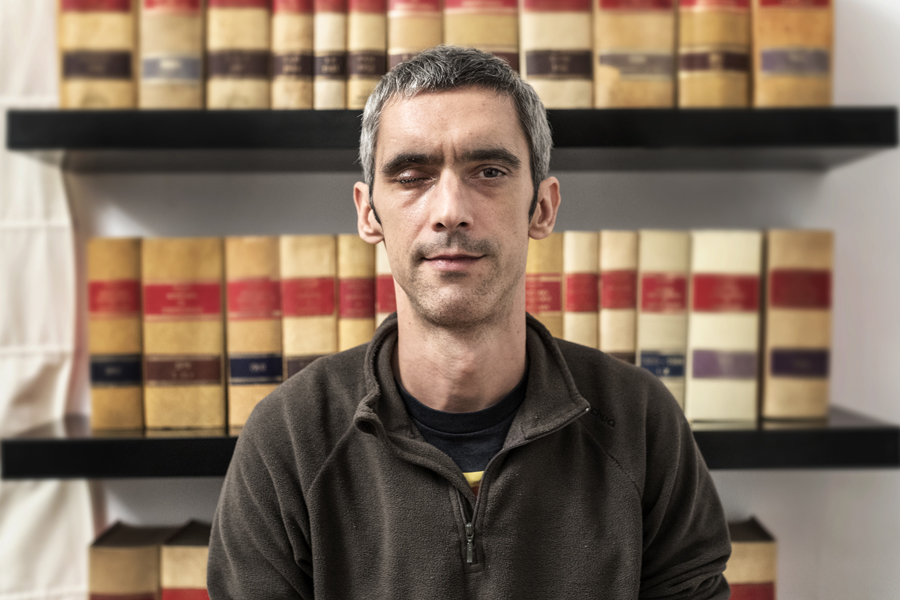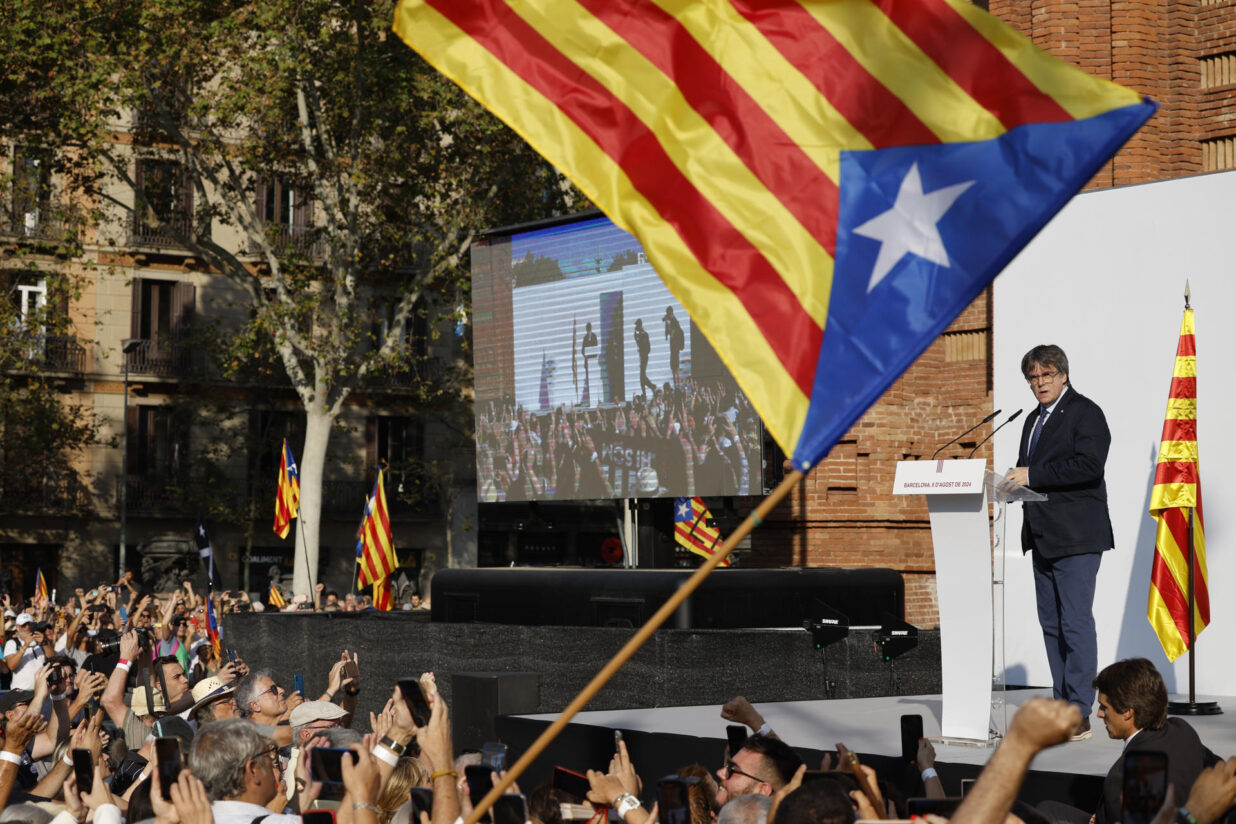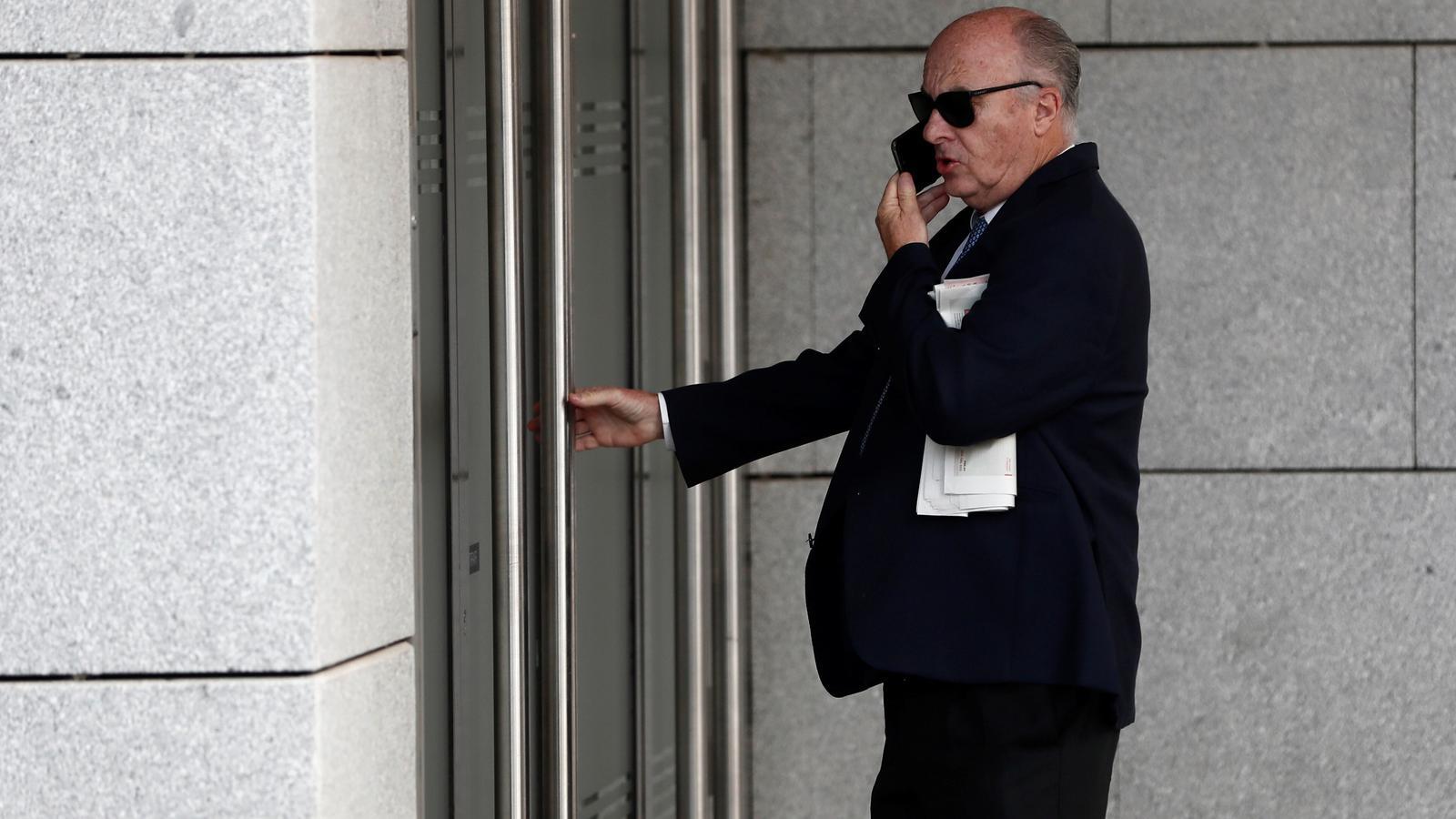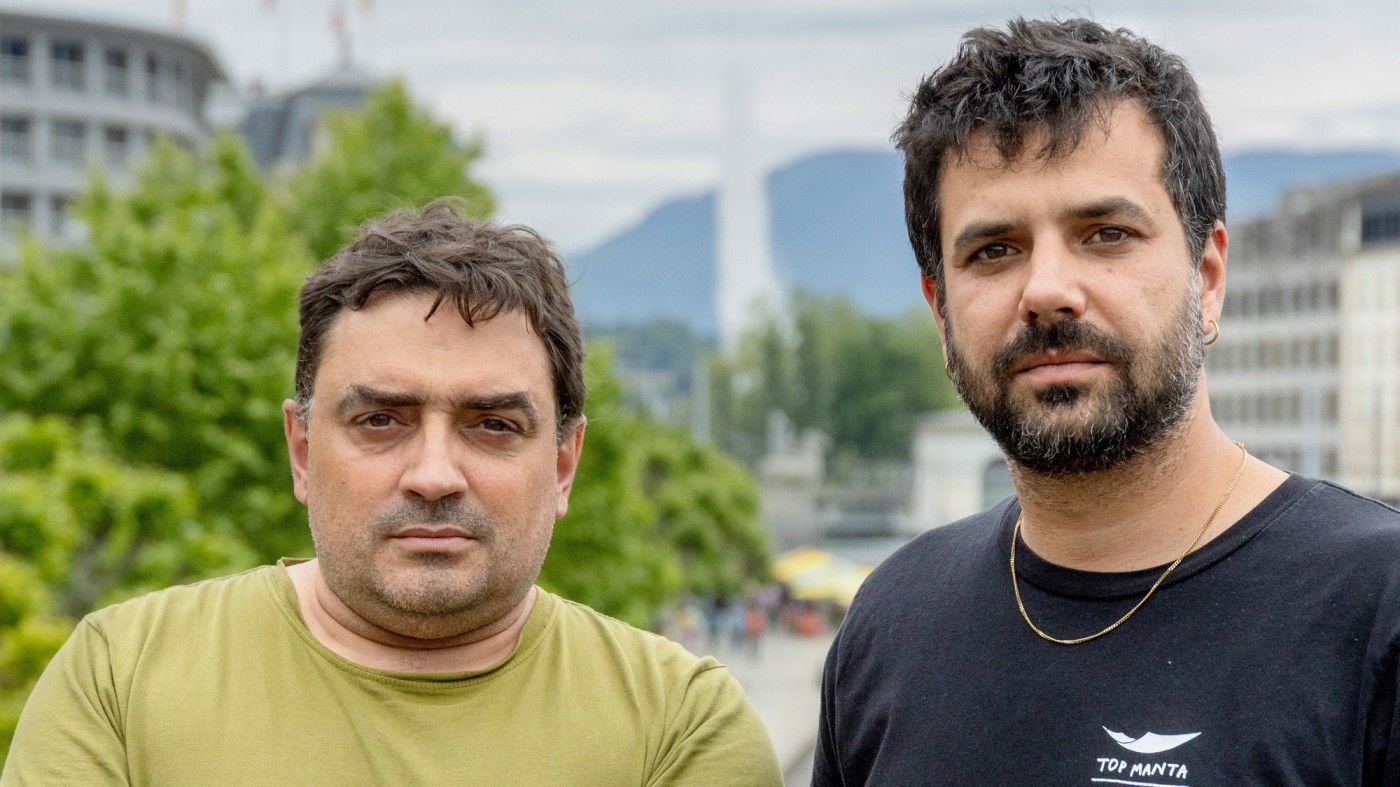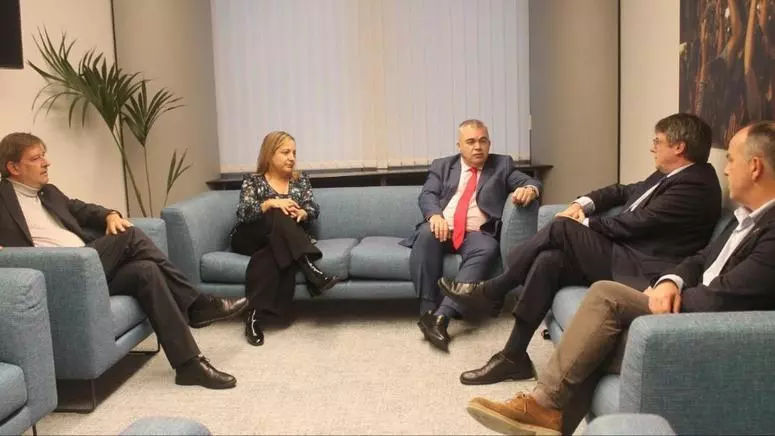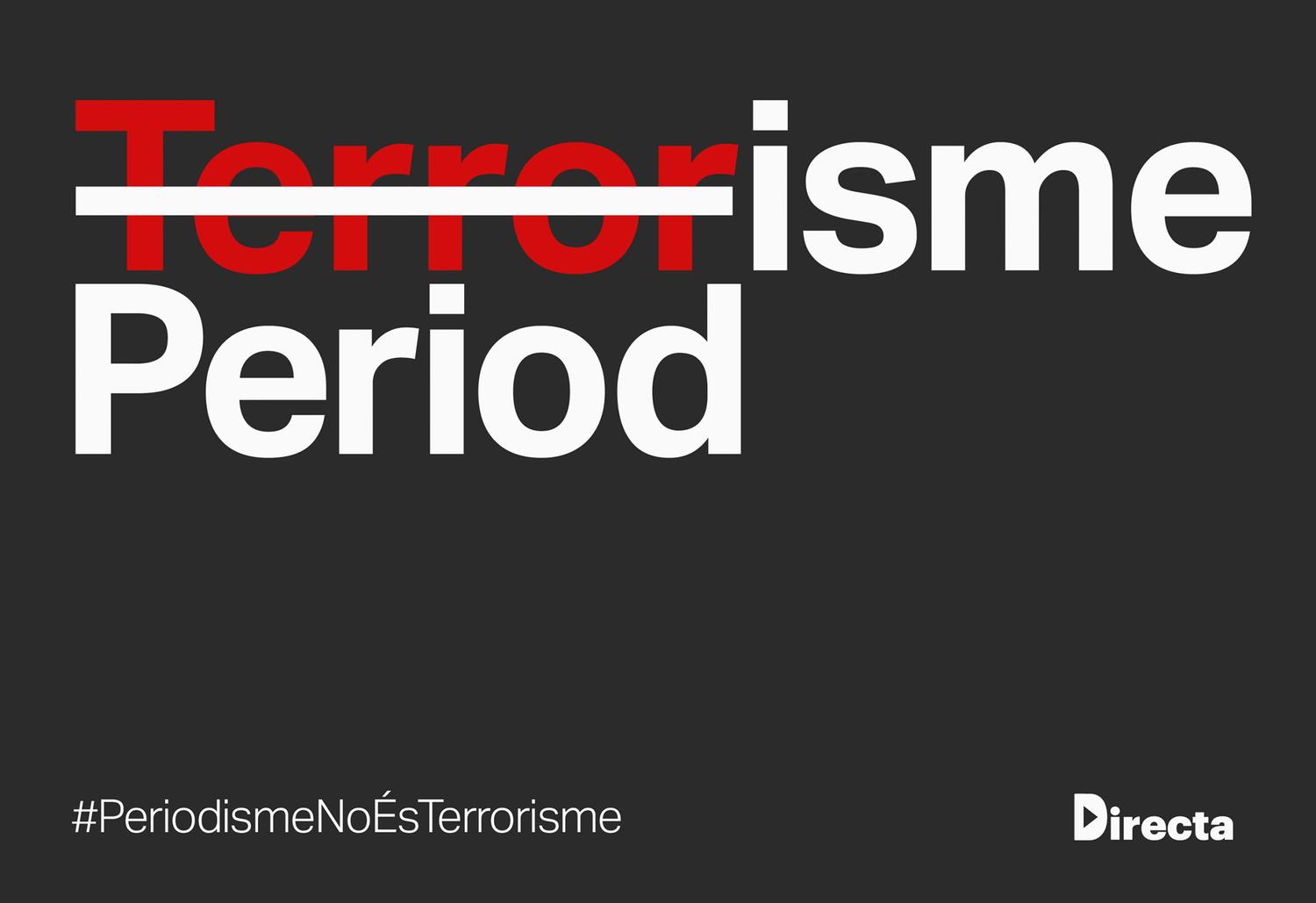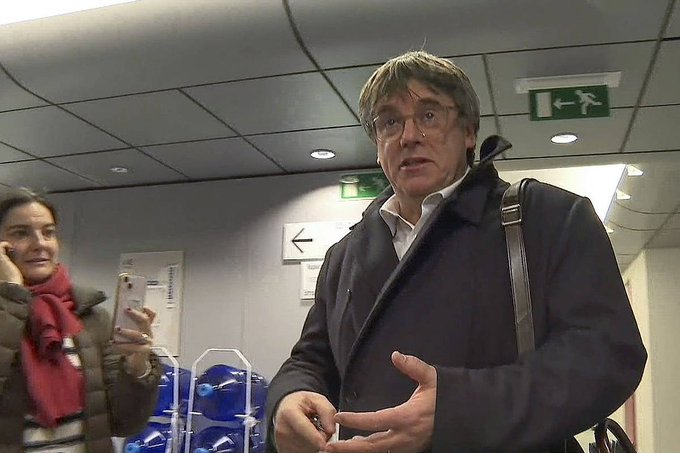"A report is being generated that would justify the intervention of the public media in Catalonia"
- David Bassa i Cabanas (1971, Granollers) is the information director of the Catalan public network TV3. Between 2011 and 2016 he was president of the Grup Barnils Journalists Association. While acknowledging the nervousness of feeling the dark shadow of the Spanish State over them, he has spoken to us with the certainty that his work is doing well. It has the data in its favour and the ideas are also very clear.
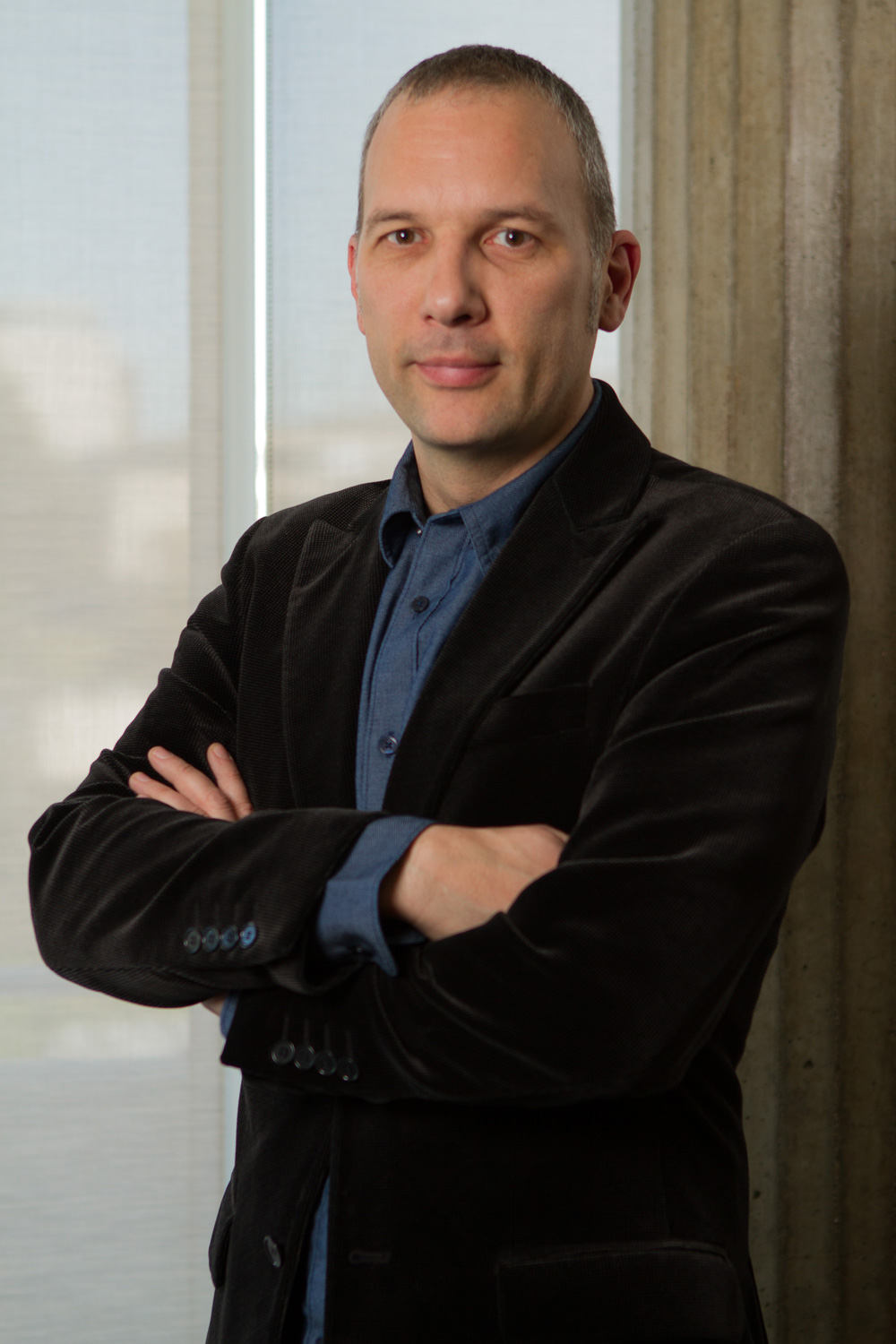
How are you TV3 members? Exciting times for journalism, right?
Yes, the most exciting we've ever met. It's an ambivalent feeling. We are excited, because it is fortunate that national public television is tackling in the first place the day after day of a process with that dimension. People are professionally proud to be able to live this moment. At the same time we are very tired, as we have a great pace making special information and monitoring as long as possible. TV3's news items have more weight than ever in programming, we are constantly making special programmes, dealing with Parliament's plenary sessions and demonstrations... And the writing is the usual one.
How many are you in the news?
300 people counting all the informations of the day. We perform the following programs: informational noon and night, morning program, 24-hour information chain, web page that we continuously update, informative programs, such as reports 30 minutes, documentaries, economic and informative InfoK of young people. In the end, we're a lot of people, but we open windows that go beyond informative ones.
You are in the spotlight of the media in Spain.
"A television that works in Catalan being the target of Spanish nationalism from time to time"
We are experiencing the campaign against TV3 with great sadness and despair. This is an utterly ill-intentioned story, of which we are convinced a story is emerging that would justify the intervention of the public media in Catalonia. The target of Spanish nationalism and centralism has been the public chain that has always worked in Catalan and has a Catalan look. They have always denounced us without any foundation, but today’s situation is scandalous. This intoxication is the desperate ethical resignation of an important part of Spanish journalism.
And what do you have to say about that?
In the Spanish media spectrum, TV3's information services are objectively the most plural. In all the informative, in the tertulias, there are all the sensitivities, which does not occur in the Spanish private and public chains. Our plurality is undeniable and the criterion is always informative. Some denounce that TV3 broadcasts live demonstrations, such as the one held in protest at the arrests of Cuixart and Sànchez by Cuixart. They criticize us all, but we do everything. We also gave support to the unity of Spain and, in addition, we directly gave it more coverage than TVE. The Catalan public who witnessed TV3 or 324 had knowledge of the demonstration, with interviews on the street and other information elaborated from it. However, they have included in the Spanish imaginary that it is partial that the situation of independence is reported.
.jpg)
What do you mean?
Let me tell you an explanatory anecdote. Ana Pastor interviewed Artur Mas, then president of the Generalitat, two years ago. He asked him what disadvantages the independence of Catalonia could have, and Mas listed him. Upon completion, when the interviewer was about to change the subject, Mas said: “Let me now turn to the good aspects of independence.” And the other said no, “that would be propaganda.” That's the imaginary you want to install: that talking about the bad of independence is impartial. But you always have to say the good and the bad. The two sides of the coin, whether you like it or not, do well or not. TV3 has never been a chain in favour of independence, but TV3 reports on the demonstrations organised by a social majority and if they are ever larger, it will, of course, be reported. That's what's out there, whether you like it or not. The Spanish media are trying to impose a great perversion of reality.
Do you provide us with some data?
"In the field of information we have been leading since 1994 and for 15 years we have doubled the number of viewers to the next edition of Tele5"
TV3 has been the most viewed network in Catalonia for seven years. In the field of information we have been leading since 1994, and for the last 15 years we have doubled the number of viewers to the next edition of Tele5. Our average share is about 25% and that of Tele5 about 12%. When important things happen, such as the referendum or the general strike, we get very high data. The day Puigdemont declared independence and suspended it, we reached 52.3% share, that is, more than half of the Catalans watching television saw TV3. It shows that when something important happens, people are looking for Catalan television.
It is a great responsibility.
Drafting Councils are very lively and very much debated. There is a constant concern about the content we offer, in order to maintain rigour and give voice to all. They will never say so, but we interviewed people who did not vote on 1 October or families of policemen who had to leave the town of Pineda to give two examples. We are constantly striving to give a voice to all sides, and we have the feeling that we are doing the work well, although we know that they will not stop shooting at us, because they are based on lies.
What atmosphere is there in the writing?
Although intoxication is constant, in the writing we have a quiet environment. Together with what we are doing, we are satisfied and satisfied. There is no censorship or directionality, and I am categorical in saying this. In the TV3 news reports, journalists write and broadcast information that they themselves produce and contrast. In the Drafting Councils, the debates are very intense and professional. This, for example, does not happen in TVE, in the delegation of Catalonia there is a great deal of tension. In addition to writing the communiqués, they have publicly made protests against censorship and authoritarianism in the Upper House. The environment is totally different, but in spite of that, they give fuel to us. It is a paradox that evidences the false controversy that has been generated with bad intent.
Can you explain the philosophy of InfoK?
In the children's chain, a 20-minute information is issued every afternoon, aimed at children up to 10 years of age. He has been on the air for 16 years and has won many awards, including UNICEF. It is one of the three European benchmarks in this field. What's going on is the philosophy of explaining it to children and getting them to understand it. This is the most difficult informative, and all the writing is very proud of this work. Let's see how you explain a child, so he can understand it, what's going on in Catalonia, or what is GDP, the economic crisis, the August bombing, the news of sexual assault, bullying ... To perform this exercise it is necessary to make a great journalistic effort, to chew a lot of information and languages to make videos. He's got an audience, and presenters are walking from school to school giving lectures. In addition, schools use these videos a lot, some almost every day, when they have to explain difficult issues.
What do you expect the Spanish State to do? Do you see the police entering the drafting of the military commandment?
"The Spanish media are imposing a great perversion of reality"
We are now in a strange moment, waiting for what happens. But yes, after the arrest of the Generalitat’s officials on 20 September, the wording intensively deepened the possibility of the Civil Guard entering TV3’s headquarters as a public television because we are a state structure. It is symbolic. We see a campaign orchestrated against us and it is clear that we are a starting point. We have experienced the situation with anguish, but we cannot always work with that pressure. We know that the state will do whatever it wants, but we are not going to give it an objective excuse. We must continue to do our job well.
If you have an excuse, they banned it and you issued the publicity for the referendum on 1 October.
Yes, by issuing this institutional publicity we knew that we disobey the precautionary suspension of the Spanish Constitutional Court, but we thought, at the very most, that the Civil Guard would come in saying “let us take away the publicity or stop the direction”. But it didn't. We broadcast, because we are public and national television, Parliament created us. We know, and we have made it clear informally, that even though the Spanish media called it an “illegal referendum”, it was not so, but a cautiously suspended referendum. It was not illegal, because there is no law that says it is illegal to hold a referendum. So there was a great perversion of language. As we are subject to Parliament, in issuing advertising, we acted in accordance with Parliament’s laws, although we knew that some Spanish laws were against it. That was the risk we had, because everything is situation, and there's not much margin.
Speaking to journalists who are much closer to popular movements and who do other kinds of journalism, they spoke very well to TV3, saying that “it is one of the most professional chains in Europe.” This doesn't happen anywhere. What are the keys?
It's a paradox, because it's not complicated. The sad thing is that this is an exception. The answer is always to prioritize the professional criterion. What happens is that many public television channels do not take precedence over professional criteria, but rather ideological, partisan or economic criteria. It seems to us a heroism, as in TV3, to put above all the criterion of professional independence and journalism. Not only because it has been decided to do so from the management, but also because of the drafting structure. It has a lot of counterweights. In addition to the works council, there is a professional committee composed of journalists from all sections and whose objective is to preserve its content. Any doubt is spoken there. Debate and self-criticism are constant. There are autonomous internal controls and journalists are voting to see which journalists should participate here. The desire to prioritize the journalistic criterion above all is explicit. Members of other media understand that, by changing the direction of information, programme managers change according to that affinity. I have been in office for a year and a half and have always made all the changes that I have made by operational criteria. There are no cases reported or suspected of the affinity of change. Because it hasn't existed. When people are put in the positions of command, they are done by journalistic criteria and route, not by political affinity. And getting it right has its fruits.
Can you imagine TV3 in Spanish?
"The main challenge is to save the intoxication campaign against us"
Not at all. The founding reason for TV3 is Catalan television. The reason why Catalonia has a decent television in its language is because it exists. “In Catalonia there are two languages and we do half and half,” says the PP and Ciudadanosetik.Hasteko there are not two languages in Catalonia, but 300, but even if the Spanish is equal to the Catalan average, it makes no sense to do half and half. We have to reflect our country and we do. In the interviews those who speak Spanish, etc., the subtitles are used a lot, but all the presenters and programs are in Catalan, because Catalan is the only one that has TV3. As a television channel we have an average of 11.5% share. This means that the other 88.5% of Spanish television channels are integrated into Spanish television channels. Therefore, the citizens who watch television in Catalonia already have an offer in Spanish. This controversy makes no sense.
What challenges do you have for the future?
The main challenge is to save the intoxication campaign. We will not fail to do our work well and we are trying to isolate ourselves from the media pressure of the Spanish media. Maintain our judgment and style... It is not going to be the intervention of the Spanish State! It would be a disaster for us, for the country and for Spanish society in general. It would be very serious from the point of view of civil rights. There are people who would justify this by the false story created by the Spanish media, by the lies they have made about Catalonia. Peaceful protests in Catalonia become disturbances [“disturbed”] or tumult [“tumulto”]. The report that is being prepared for the Spanish society to buy interventionism and aggression against the State is very dangerous.
“Kataluniako garai erabakior hauetan, hainbat medio erabakitzeko eskubidearen aurka ari direla argi ikusten da, eta beraz, mugimenduak gertatzen ari dira: jendea hedabidez aldatzen ari da, El País gisako hainbat mediotan zutabegileak zentsuratzen edo joaten ari dira, medio berriak sortzen ari dira... Kataluniako gizartea berkokatzen ari da, eta hedabideak horren isla dira”. La Directako kazetari David Bou eta Jesús Rodriguezekin bildu gara, hedabideen prismatik abiatuta, egoera aztertzeko.
Hedabide publiko eta pribatuak bereizten dituzte analisirako. Pribatuen alorrean, prozesuaren beroan hainbat medio digital sortu edo aurretik existitzen zirenak indartu dira. Hor aipatzen dituzte El Mon, Nació Digital eta Vilaweb adibidez. “Hedabide hauek diru-laguntza publikoak jasotzen dituzte, eta albisteak sortu eta sortu ari dira, asko biralak, proiekzio handia emanez soberanismoaren kontakizunari”, dio Bouk. Hedabide hauek harpidedunak irabazten ari dira beren hitzetan.
Txanponaren beste aldean, papereko egunkariak. Rodriguezen hitzetan, azken sei urteetan Bartzelonako kioskoen erdia inguru itxi dute, eta egun, paperak ez du hainbesteko eraginik: “Egunkariak medio digital bilakatzen ari dira, eta egunkarien salmenta ia %70 jaitsi da”. Bere hitzetan “prentsa idatzia hilzorian dago”, eta El Periodico eta El País gisako egunkariak ez badituzte itxi, batzuek hori gerta ez dadin dirua jartzen ari direlako da. La Vanguardiari negozio arazo bat ikusten diote: bere irakurlegoa prozesuan sartuta dago, zuzendaritzak berau suntsitu nahi duen bitartean. Hortik hitzak neurtu beharra, milaka harpidedun galdu nahi ez badituzte.
Herri mugimenduei eta protesta sozialei arreta handiagoa jartzen dien La Directako kideak pozik daude. Harpidetzetan gora ari dira, eta jende berria proiektura erakartzeko aukera ikusten dute egoera politiko honetan. Erreferendum eguna jorratzeko, aurretik greba orokorretan hasitako bidetik, hemeretzi kolektibo eta herri hedabidek indarrak batu zituzten Agència UO (Urriak 1 Agentzia) sortzeko. Guztira 150 lagun aritu ziren lanean egun horretan. Zer hobetua ikusten badute ere, halako ekimenen potentziala argi dute: lanera jende berria aktibatu eta bertan trebatzeko aukerak handiak dira. Aurrera begira, beren lekua berregiten ari direla diote, makro-politikak hartu duen dimentsioa ikusita, eta beste hedabide batzuekin albiste kopuruan ezin dutela konpetitu jakitun, beste eztabaida batzuk mahai gainean jartzeko arrakalak irekitzeko egin nahi dute lan. “Orain gizartea oso harbera dago eta zer gertatzen ari den ulertzeko iturri eta ikuspuntu berriak bilatzen ari da. Aukera bikaina da gurea bezalako proiektuentzat, ehunka milaka lagun daude burua zabalik”.
Hedabide publikoak jo-puntuan
TV3 eta Catalunya Ràdiok albistegien esparruan duten nagusitasuna oso esanguratsua iruditzen zaie Rodriguez eta Bouri: “Albistegien kulturak erabakitzen du gertatzen ari denaren eta ez denaren marko mentala. Horregatik joango dira, goiz edo berandu, TV3 eta Catalunya Ràdioren bila”. 155 artikulua aplikatu eta autonomia bertan behera utzita, aginte-kate eta egitura politiko kontuagatik, Lehendakaritza kontseilaria erori ostean, honen azpian TV3 eta Catalunya Ràdioko buruak daudela gogoratzen dute. “Denaren bila joango dira”.
Herritarrek orokorrean TV3 ez dutela arriskuan ikusten uste dute. “Ez naiz inoren gainetik jarriko moralki, baina batzuetan inozentzia puntua dagoela iruditzen zait. Halere, esan behar dut oso harrituta nagoela ikusita mobilizazioak zein puntutara heltzen ari diren, jendea eskolen atarietan egon baitzen eta jipoituta atera asko. Dena den, uste dut ez garela kontziente zer nolako tamaina hartzen ari den guztia. Gure belaunaldia ez gara hain egoera zailean sekula egon, ez ditugu imajinatu ere egiten gertatuko diren gauzak, gertatzear dago”, dio Bouk.
“Nora doa hau?” galderari erantzun gordina eman dio Rodriguezek: “Hemen unionistek ez dituzte hauteskundeak irabaziko. Katalunia indarrez hartu beharko dute. Zazpi urteko prozesuaren nekea neke, azken hilabetean gertatu den guztiarekin harri bat bezain gogor dago bi milioi pertsonatik gorak osatzen duten blokea, eta 155. artikulua aplikatuta, gehiago. Alderdi independentista guztiak ezin dituzte ilegalizatu, hori egiteko, estatu kolpe bat fundamentuz ematen duzu. Halere, errepresio maila traumatikoak aplikatzeko gai dira”, dio kazetari zailduak. Bere ustez, hildakoak badaude baliteke klase ertainek borroka utzi nahi izatea, baina kontrakoa ere gerta daitekeela dio. “Nik ez dut garbi ikusten nola kontrolatuko duten lurraldea. Agian Bartzelona kontrolatzera hel daitezke indar guztia horretara jarrita, baina Katalunia osoa?”.
Lau agenteak lesio-delituengatik ikertzen ari dira eta horrek galarazten du 2024ko amnistia aplikatzea. Polizia horietako batek, ustez, gomazko bala batekin begi bat zartatu zion Roger Español kataluniarrari.
Walk from a train station, two friends and a hug. This hug will be frozen until the next meeting. I'll come home, he'll stay there. There, too, will be free the painful feeling that injustice wants us to catch. Jesús Rodríguez (Santa Coloma de Gramenet, 1974) is a journalist,... [+]







